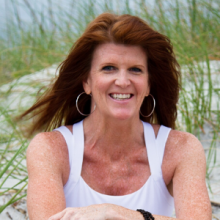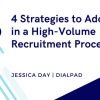To learn more about mindfulness and leadership, read Deb’s interview on the SIG Speaks Blog.
We are in an unprecedented time around the world, with an extremely wide gap in coping skills. Finding calm and peaceful moments is more important than ever right now. Chronic stress and anxiety takes an incredible toll on many bodily systems, most crucially, the immune system. If we can regulate our own emotions, we can pay better attention to those around us and increase empathy and morale.
As we move into the unknown, witnessing society’s reactions on the news and social media on top of our own reactions, it is easy to stumble into the “Panic Sinkhole.” We have genuine concerns about our families, communities, jobs and quite literally, the global economy. So how do we find any moments of calm during this pandemic?
Before we look at how, let’s explore the why.
Incorporating Active Moments of Mindfulness
Why is it crucial to incorporate active moments of mindfulness? Let’s look at what is happening to the body and brain when we panic. Simply put, the brain senses danger and fires up the fight, flight or freeze response, or “acute stress response.” This discharges the sympathetic nervous system, sending a cascade of hormones to activate the body to survive. The part of the brain responsible for decision making, the prefrontal cortex, is told to take a back seat. You may begin to feel your heartrate increase, palms begin to sweat and your blood pressure increase.
All bodily systems are working to keep us alive, and this is a good reaction when we are in sudden and real danger. The problem is when we are in this state for a prolonged period of time. When we are dealing with such an epic scale of stress, this can be compounded and the reality is that we have no idea how long this current pandemic will last. Interweaving our day-to-day situations with mindfulness techniques can have a very real effect on our body-brain complex, and our ability to interact with each other in a thoughtful, compassionate way.
Where We Can Intervene
We need to balance out the nervous system and wake up the prefrontal cortex as it has a crucial role in executive planning, problem-solving and focus. Without it operating at capacity, we feel flustered, confused, overwhelmed and can’t make important cognitive decisions. All of this, we can agree, is crucial in times of chaos.
So now back to the how. The first step is to recognize that you are feeling stressed or anxious and bring awareness to how your body is reacting to the trigger. Then bring your attention to your breathing. Notice where you feel expansion with the inhale and where you feel contraction with the exhale. Take full, deep inhalations and long, slow exhalations. Notice the automatic release of tension with each exhale, regardless of how subtle.
Remember, you are simply observing the breath here. Stay focused on each inhale and exhale for the next five breaths.
Now you will lengthen the exhale, making it longer than the inhale.
Inhale in as you silently count to 6.
Exhale as you silently count to 8.
Continue this breath pattern for five more rounds, closing the eyes if appropriate.
Steer Towards a Calm
The simple act of breathing, and bringing awareness to the breath, stimulates the vagus nerve. This causes a cascade of hormones that relax the body and bring the nervous system back into balance. The heartrate slows, the blood pressure drops and can quite literally pull you out of that “panic sinkhole.”
If you can find the ability to steer toward a calm, collected presence, you will find that those around you will feel it as well. Your calm presence can be contagious to those around you.
“When the crowded Vietnamese refugee boats met with storm or pirates, if everyone panicked, all would be lost. But if even one person on the boat remained calm and centered, it was enough. It showed the way for everyone to survive.” - Thich Nhat Hanh







